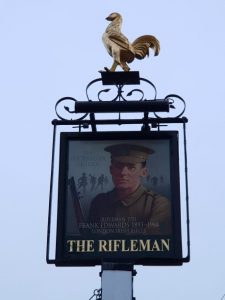Defiance in the Trenches: How the game survived thanks to ‘The Footballer of Loos’
This weekend marks exactly 100 years since the conclusion of the First World War and as we prepare to commemorate the sacrifice of all the soldiers that gave their lives, locals of one Twickenham pub are remembering a unique story of their own. In the back streets, lies the Rifleman pub, named for Frank Edwards, better knows as the ‘Footballer of Loos.’
On the morning of 25th September 1915, ahead of the London Irish Rifles charge on enemy lines at the Battle of Loos, Edwards re-inflated his ball; he then proceeded to throw the ball up, cry out ‘Play up London Irish’ and kick the ball towards the German line.
His audacious plan was to kick the ball across no man’s land and ‘score a goal’ in the German trenches. This was the first “big push” on the Western Front and took place outside the small French town of Loos.
Over 21,000 soldiers perished in the battle, yet the legacy of their sacrifice lives on, as does the statement made by Edwards on that day.
Edwards was gunned down in the pursuit of this goal, but he survived and returned home to live in Twickenham, London.
It is here where the Rifleman now stands in homage to Edwards’ actions that day. The walls are adorned with pictures and maps to commemorate him, with a friendly set of locals on hand to educate any first-time visitor on the history of the pub. Their famous sign was erected in 2012 and was marked by a visit from veterans of the London Irish Rifles as well as the Mayor at the time, Rita Palmer. It was awarded Pub Sign of the Year the following 12 months and the family still visit once a year to pay their respects.

In the London Irish Rifles, footballs were routinely punctured by officers. Rifleman Frank Edwards defied the orders of his superiors to instigate a remarkable moment of defiance.
His football was also rescued from the battlefield and is now on display at the London Irish Rifles’ museum.
Alex Shooter, the curator of the museum told the Sports Gazette in 2015: “The fact that it was an incident of total disobedience separates it from other war stories.
Unlike the stories of the Christmas Day match, “This act was a matter of defiance.
“His intention was to say, come on lads, we can score against these buggers, no problem. There wasn’t any great conspiracy or any well thought out plan. I think, more than anything, it was just to defy authority. It’s one of the great personal stories of the First World War.”
Edwards was one of the few soldiers on the front lines that were determined to not let football die. His actions inspired Captain William Nevill to do the same.
In 1916, Nevill brought six footballs into the trenches of the Somme. His East Surrey regiment led the famous “Football Charge” on the first day of the Battle of the Somme on 1st July 1916.
As Mr Shooter described: “It gave them something to focus on while they crossed the killing ground – he used it to motivate his troops.”
The importance of such actions can not be overstated as football was not the omnipresent force it is now. Football’s relationship with society was a particularly fractious one, with mutinous allegations thrown at players and fans whose presence at wartime fixtures was deemed to be hampering the recruitment effort.
With the continuation of the football league, protests took place both inside and outside grounds. Lord Durham most notably expressed his wishes for the Germans to bomb Roker Park so as to encourage men to rethink their wartime role.
Such was the criticism levelled at the ongoing league campaign, some clubs faced financial ruin as a result of dwindling crowds.
Football refused to be labelled as unpatriotic. A meeting at Fulham Town Hall on 15th December 1914 turned into a mass recruitment drive and ended with the creation of the 17th Middlesex Division – better known as the Footballer’s Battalion.
Men from 11 clubs enlisted in the battalion led by the revolutionary Walter Tull, himself one of the first professional black footballers in Britain as well as the first black man to become an officer in the British Army.
With the creation of footballer’s battalions, domestic football came to a halt the following year. However, as the Footballer of Loos demonstrated, there were men in the ranks determined to keep the game alive on the front lines.
The Footballer of Loos is an example of the spirit of the game in the rawest possible form, something that is so often lost on the modern-day prima donna. In the face of such appalling conditions and the prospect of imminent death, there was a group of men determined to keep prevent football suffering the same fate. If they were going to die, they were going to die doing what they loved.
This concerted effort to cling on to football as a reminder of dear old blighty and the commitment to the cause of many of the nation’s footballers meant that football as a sport refused to die.
Even in the worst of times, football can be a great uniting factor and it proved that there was room for the game alongside being patriotic. Perhaps the reason football is so ingrained in the psyche of the modern Brit is the fact that football and society went through this harrowing experience together and came out hand in hand.